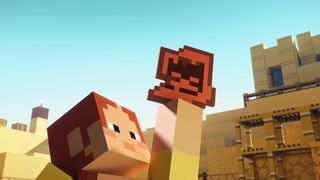Minecraft wiki completes exit from Fandom, gets ready to fight its own zombified corpse
Very happy to leave the yellow sidebar behind.

In July this year PCG reported on a brewing controversy—far from the first—at the wiki hosting service Fandom. The editors and contributors of the Minecraft wiki, one of the site's largest, had had enough, and angered by what they saw as "degraded" functionality and endless popup ads, began the process of voting on a full scale migration away from the site, and towards a new host.
The Minecraft wiki is now born again thanks to *checks notes* Weird Gloop. After a discussion among contributors, this host was chosen because it "has a minimal amount of ads, a strong set of technical infrastructure, lots of transparency, and a strong track record regarding the SEO competition with Fandom for page ranking." Weird Gloop also hosts the Runescape wiki, which was one of the first to break away from Fandom (then Wikia) in a similar manner.
We'll get to the wider picture in a moment, but all of the Minecrafters involved seem very happy with the decision and their new home, and the project page relating to the move lists a bunch of the benefits users should see in the new-slash-old wiki: primarily the look and functionality (complete with new logo), fewer ads, improved search functionality, no more age popups, and the return of anonymous editing.
Note that, as part of the migration, the original Minecraft wiki remains on Fandom and, thanks to the scale of the game, will no doubt attract other contributors. So there's a fork with two Minecraft wikis starting from the same place and, yes, it's pretty clear there's little love lost between them.
This is only the latest of many high-profile game wikis (Zelda, Terraria, Ark, Path of Exile, Runescape) choosing to move away from Fandom, which began as a for-profit wiki hosting service called Wikia that was co-founded by wiki overlord Jimmy Wales. Fandom is a hugely popular website but most of these departures can be traced back to its acquisition in 2018 by private equity firm TPG Inc., after which it acquired competitors including Gamepedia (which had the official wikis for The Witcher, Minecraft, Dota 2, COD and WoW). All of this content was gradually migrated centrally before a mid-2021 rebrand to Fandom.
The sense among all of these wiki communities is that the Fandom site's design is user-unfriendly, festooned with ads and popups, and that the company more widely adds automated links where they shouldn't be and pays no attention to user feedback. There were also deep feelings in this case, and do try to keep a straight face here, about a recent controversy with the McDonalds wiki: Fandom replaced the existing Grimace page to a paid-for McDonalds advertorial, without the consent or knowledge of the McDonalds wiki editors.
Fandom's high SEO ranking means the new Minecraft wiki will face a battle to establish itself with the wider audience, however, most of whom could care less about wiki controversies and just want to know something about Creeper stats. It will face issues with things like Google hiding duplicate content in search results, meaning a lot of content will need rewritten, and the big twist of the knife is that these contributors are essentially battling to overcome something they built.
The biggest gaming news, reviews and hardware deals
Keep up to date with the most important stories and the best deals, as picked by the PC Gamer team.
But the deed is done. The Minecraft wiki has left Fandom and is free to roam and grow outside the oppression of a giant yellow navigation bar. Whether it can escape its own gravitational pull is another question, but the depth of feeling against Fandom is something that should concern such a user-dependent business. These Minecraft contributors took a look at what it offered, and the alternatives, and told Fandom to get forked.
Rich is a games journalist with 15 years' experience, beginning his career on Edge magazine before working for a wide range of outlets, including Ars Technica, Eurogamer, GamesRadar+, Gamespot, the Guardian, IGN, the New Statesman, Polygon, and Vice. He was the editor of Kotaku UK, the UK arm of Kotaku, for three years before joining PC Gamer. He is the author of a Brief History of Video Games, a full history of the medium, which the Midwest Book Review described as "[a] must-read for serious minded game historians and curious video game connoisseurs alike."

Palworld developer reports Nintendo's suing over 3 Pokémon patents for only $66,000 in damages, but a videogame IP lawyer says fighting the lawsuit could mean 'burning millions of dollars'

No Man's Sky gets cross-save on a dozen platforms and brings back Mass Effect's Normandy as a limited-time rewar
Most Popular






